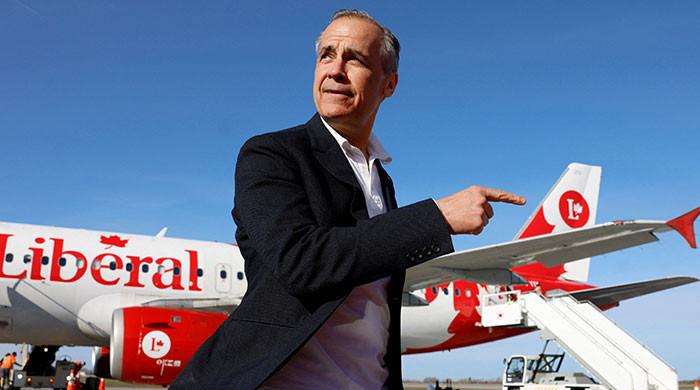Ottawa: Canadian Prime Minister Mark Carney, on Monday, won a key political victory after his liberal party won the Canadian elections.
Carney, who has a history of assuming roles at challenging times, said a term as a prime minister despite never having served in Parliament, which is not precedents in Canadian history.
“I am more useful in a crisis. I am not so good in peacetime,” he said during the campaign.
Carney assured a term as a prime minister despite having ever served in Parliament, which is not precedents in Canadian history.
Even without experience in the government, he convinced voters that his background who treated with financial agitation equipped him to take Canada through the commercial war of the president of the United States, Donald Trump.
A father of four 60 -year -old children was born near the Arctic in Fort Smith, in the territories of the northwest of Canada, but grew up in the western city of Edmonton.
Like many Canadians, he played hockey in his youth. He studied in Harvard in the United States and Oxford in England, and made a fortune as a banker of investments at the beginning of his career at Goldman Sachs, working in New York, London, Tokyo and Toronto.
Carney then joined the Canadian civil service, and finally he was appointed governor of the Bank of Canada in 2008 by former Prime Minister Stephen Harper, a conservative.
The global financial crisis broke out shortly after, and Carney was among a group of leaders accredited with the Canadian direction through a relatively unscathed international collapse.
In 2013, the then Prime Minister of the United Kingdom, David Cameron, took advantage of him to direct the Bank of England, turning Carney into the first No Briton to lead the institution since its foundation in 1694.
Then, the United Kingdom voted to leave the European Union, and Carney played a key role in the reassuring markets after the 2016 Brexit vote.
When the Canadian announced that he left the bank at the end of 2019, the then Minister of Finance of Great Britain, Sajid Javid, said Carney had led “with condemnation, rigor and intelligence.”
In a recent appearance in a Canadian comedy program, the host, which lists the financial crisis, Brexit and Trump’s commercial war, joked that Carney could be guilty of the economic agitation that follows.
Laughing, Carney said: “It’s the other way around. I enter to fix these things.”
Isolated stumbling
The reports that Carney was interested in entering Canadian politics has circulated for years.
In January, after the then Prime Minister Justin Trudeau announced his plans to resign, Carney launched a campaign to lead the Liberal Party.
Analysts questioned whether a technocrat without experience in retail policy could energize a party facing unpleasant surveys, since it wrath the Trudeau emerged after a decade of power.
The professor at the University of Dalhousie, Lori Turnbull, has noticed that Carney “does not have a dynamic communication style.”
And yet, he went on to win the race of the Liberal Party and the general elections.
Carney had isolated the stumbling blocks during the campaign, but experts said that her most effective moments were those when she assumed the role of the prime minister and assaulted Trump in front of a row of Canadian flags.
“The ancient relationship we had with the United States based on the deepening of the integration of our economies and strict military security and cooperation is over,” said Carney last month after Trump released her automatic tariffs.
Personal wealth: a delicate topic
After leaving the bank of England, Carney wrote a book and became an advisor to the United Nations about climate change and finance.
He also returned to the private sector as president of Brookfield Asset Management, an important multinational Canadian company.
Carney faced difficult questions about his experience in the private sector, including any role he played to help Brookfield reduce his Canadian fiscal burden.
He also had tense exchanges with journalists when asked about his personal wealth.
Carney was pressed to reveal her assets, including the actions she had, so that voters could judge if she faced any conflict as prime minister.
He replied that he put all his assets in a blind trustee, complying with Canada’s ethics rules.
“Look within yourself,” he told a journalist who pressed him last month about his decision not to reveal his assets.
“You start from a prior of conflict and bad will,” he accused.
“I have defended myself from Canada. I have left my roles in the private sector at a time of crisis for our country.”




